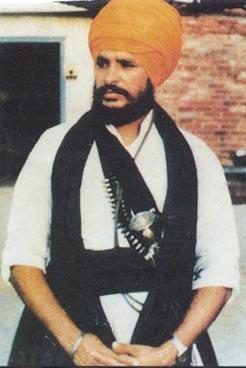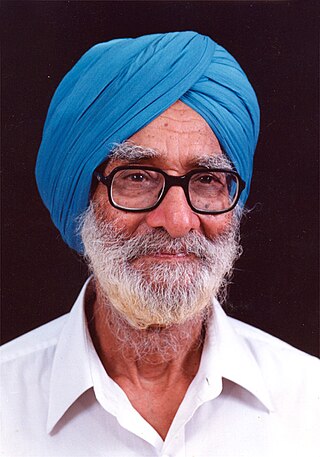Related Research Articles

The Shiromani Gurdwara Parbandhak Committee is an organization in India responsible for the management of gurdwaras, Sikh places of worship, in the states of Punjab and Himachal Pradesh and the union territory of Chandigarh. SGPC also administers Darbar Sahib in Amritsar.

Talwinder Singh Parmar was an Indian militant, Sikh separatist, and the mastermind of the 1985 Air India Flight 182 bombing, which killed 329 people. It was the worst single incident of aviation terrorism in history until the September 11 attacks in the United States. In addition, another bomb was meant to explode aboard Air India Flight 301 in Japan the same day, but it exploded while the plane was still grounded, killing two people. Parmar was also the founder, leader, and Jathedar of Babbar Khalsa International (BKI), better known as Babbar Khalsa, a Sikh militant group involved in the Khalistan movement.

Sevā is the concept of selfless service that is performed without any expectation of reward for performing it. It is predominant in Hinduism and Sikhism. Such services can be performed to benefit other human beings or society. Sevā means "service". A more recent interpretation of the word is "dedication to others".

Bhai Kanhaiya, known as Khat Waro Bao and Khaatwala Baba in Sindh, born to Mata Sundari ji and father Sri Nathu Ram's home village Saudra district Sialkot now in Pakistan, was a Sikh of Guru Tegh Bahadur and was requested to establish the Sewapanthi or Addanshahi order of the Sikhs by Guru Gobind Singh. He was known for pouring water for all the wounded members of the battlefield no matter whether they were Sikhs or fighting against the Sikhs.

Jathedar Sukhdev Singh Babbar was a was an Indian militant, Sikh separatist, and co-leader of Babbar Khalsa (BK), a Sikh militant organisation involved in the pursuit of creating a Sikh nation named as "Khalistan" and generally believed responsible for the 1985 bombing of Air India Flight 182, although Sukhdev was never named as being involved. BK was founded by Talwinder Singh Parmar, himself, and Amarjit Kaur. He commanded BK continuously for 14 years until he was killed in 1992. He was a member of the AKJ.

Khalsa College is a historic educational institution in the northern Indian city of Amritsar in the state of Punjab, India. Founded in 1892, the sprawling 300-acre (1.2 km2) campus is located about eight kilometers from the city-center on the Amritsar-Lahore highway, adjoining Guru Nanak Dev University campus, to which Khalsa College is academically affiliated.

Surinder Kaur was an Indian singer and songwriter. While she mainly sang Punjabi folk songs, where she is credited for pioneering and popularising the genre, Kaur also recorded songs as a playback singer for Hindi films between 1948 and 1952. For her contributions to Punjabi music, she earned the sobriquet Nightingale of Punjab, the Sangeet Natak Akademi Award in 1984, and the Padma Shri in 2006.
Jat Sikh or Jatt Sikh is an ethnoreligious group, a subgroup of the Jat people whose traditional religion is Sikhism, originating from the Indian subcontinent. They are one of the dominant communities in the Punjab, India, owing to their large land holdings. They form an estimated 20–25% of the population of the Indian state of Punjab. They form at least half of the Sikh population in Punjab, with some sources estimating them to be about 60–66% appx. two-third of the Sikh population.

The Nakai Misl, founded by Sandhu Jats, was one of the twelve Sikh Misls that later became part of the Sikh Empire. It held territory between the Ravi and Sutlej rivers southwest of Lahore in what became Pakistan. The misl fought against the Sials, the Pathans and the Kharals before it was incorporated into the Sikh Empire of the Sukerchakia Misl by Ranjit Singh.

Diljit Dosanjh is an Indian singer, actor and film producer who works in Punjabi and Hindi cinema. Dosanjh entered the Social 50 chart by Billboard in 2020. He has been featured in various music charts, including the Canadian Albums Chart, the UK Asian chart by Official Charts Company and the New Zealand Hot Singles. His films, including Jatt & Juliet 2, Sajjan Singh Rangroot and Honsla Rakh are among the highest grossing Punjabi films in history.
Muhammad Sadiq is a Punjabi-language singer, actor and politician from Punjab, India. He is best known for his duets with singer Ranjit Kaur. He was the Member of Parliament, Lok Sabha for Faridkot, Punjab constituency from 2019 to 2024 .He was the Congress party MLA from Bhadaur in Punjab from 2012 to 2017.

Aman Singh Dhaliwal is an Indian model-turned-actor, who works in Punjabi cinema, where he is known as an action hero. He is from the city of Mansa, Punjab. Best known for his changing looks with each role, he has worked in Bollywood, Pollywood, Pakistani and Telugu movies including Big Brother (2007), Jodhaa Akbar (2008), Virsa (2010), Ik Kudi Punjab Di (2010) and Ajj De Ranjhe (2012).

The Shiromani Akali Dal (SAD) is a centre-right Sikh-centric state political party in Punjab, India. The party is the second-oldest in India, after Congress, being founded in 1920. Although there are many parties with the description Akali Dal, the party that is recognized as "Shiromani Akali Dal" by the Election Commission of India is the one led by Sukhbir Singh Badal. The party has a moderate Punjabi agenda. On 26 September 2020, it left the National Democratic Alliance over the farm bills.

Dr. Harcharan Singh (1914–2006) was an Indian dramatist and writer in the Punjabi language. He dedicated 69 years of his life to Punjabi theater, in which he authored 51 books and staged numerous plays all over the world.

The Unsafe Asylum: Stories of Partition and Madness is a 2018 collection of short stories by Anirudh Kala. The book includes a number of interlinking stories which explore the effects of partition on the mental health of people from both India and Pakistan.

Amandeep Sandhu is a Punjabi writer and journalist who writes in English. His second novel Roll of Honour was nominated for Hindu Literary Prize for Best Fiction in 2013.

Amandeep Singh Madra OBE is a historian, author and media commentator.
Punjabi New Zealanders are New Zealanders who are of Punjabi descent. Their ancestry originates wholly or partially in the Punjab region of South Asia, constituting a subgroup of Indian New Zealanders and Pakistani New Zealanders.
References
- ↑ staff (30 June 2013). "A brush with Ami". Tribune India . Retrieved 24 August 2014.
- ↑ staff (24 April 2009). "I Want to Portray the Real Punjab". India Today . Retrieved 24 August 2014.
- 1 2 staff (2009). "Director/Producer: Daljit Ami". Sikh International Film Festival. Sikh Art and Film Foundation. Archived from the original on 8 August 2014. Retrieved 24 August 2014.
- ↑ staff (19 March 2013). "National Award for Punjabi film "Nabar"". Cine Punjab News Network. Retrieved 24 August 2014.
- ↑ Ami, Daljit (17 March 2014). "Scoot! Sherry Paaji Is in Da House". Outlook India . Retrieved 24 August 2014.
- ↑ Ami, Daljit (5 May 2014). "What The Dickens". Outlook India . Retrieved 24 August 2014.
- 1 2 3 Sharma, Sarika (5 July 2014). "Haryana boys led first mutiny of World War I". Times of India . Retrieved 24 August 2014.
- 1 2 staff (19 May 2013). "Documentary on gender violence screened". Indian Express . Retrieved 24 August 2014.
- ↑ Article title [usurped] Day & Night News
- ↑ Sandhu, Amandeep (2 August 2014). "Digitising memories". The Hindu . Retrieved 24 August 2014.
- ↑ staff (20 May 2013). "Timekeepers: Reality byte". Tribune India . Retrieved 24 August 2014.
- ↑ Kaur, Amarjot (11 May 2013). "Short & sweet: Different arena". Tribune India . Retrieved 24 August 2014.
- 1 2 3 Tribune News Service staff (23 December 2012). "Workshop dwells on film-making nuances". Tribune India . Retrieved 24 August 2014.
- 1 2 TNN staff (27 April 2003). "Video brings out profit factor in wars". Times of India . Retrieved 24 August 2014.
- ↑ Singh, Nonika (29 April 2013). "On a Path Less Troden: Daljit Ami". Punjabi Mania. Archived from the original on 12 April 2015. Retrieved 24 August 2014.
- 1 2 Bharti, Vishav (11 August 2006). "'Not Every Time...' Scores". OhMyNews. Archived from the original on 5 March 2016. Retrieved 24 August 2014.
- 1 2 Singh, Sanjam Preet (2 July 2013). "Tale of untiring 'seva'". Hindustan Times. Archived from the original on 22 August 2014. Retrieved 24 August 2014.
- 1 2 Dogra, Chander Suto (27 May 2013). "Endangered texts". The Hindu . Retrieved 24 August 2014.
- 1 2 Singh, Nonika (26 April 2013). "On a path less trodden". Tribune India . Retrieved 24 August 2014.
- ↑ Kaur, Preeti (15 December 2014). "Roll of Honour: An Interview With Author Amandeep Singh Sandhu, and Punjabi Translator Daljit Ami". Sikh Chic. Retrieved 27 June 2015.
- ↑ Banerji, Aparna (20 January 2011). "Keeping tales of revolutionaries alive". Tribune India . Retrieved 24 August 2014.